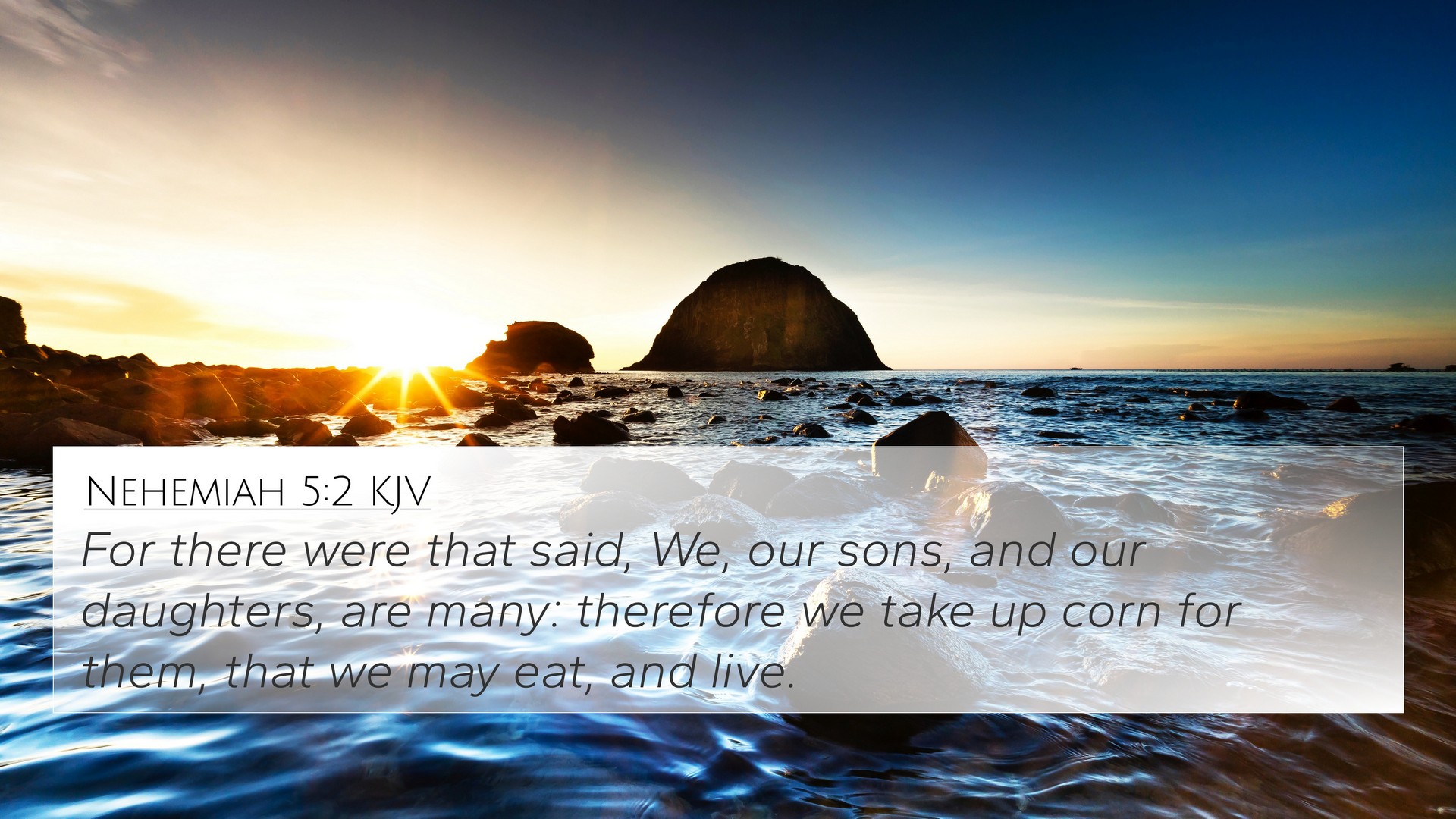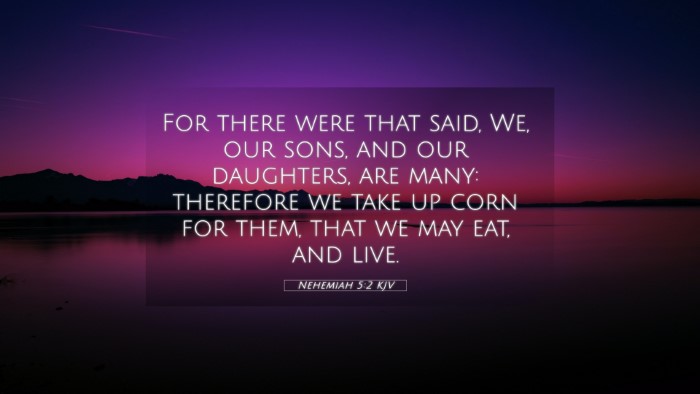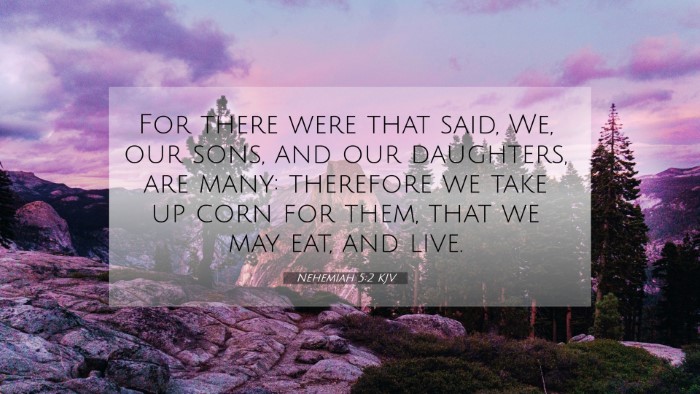Old Testament
Genesis Exodus Leviticus Numbers Deuteronomy Joshua Judges Ruth 1 Samuel 2 Samuel 1 Kings 2 Kings 1 Chronicles 2 Chronicles Ezra Nehemiah Esther Job Psalms Proverbs Ecclesiastes Song of Solomon Isaiah Jeremiah Lamentations Ezekiel Daniel Hosea Joel Amos Obadiah Jonah Micah Nahum Habakkuk Zephaniah Haggai Zechariah MalachiNehemiah 5:2 Similar Verses
Nehemiah 5:2 Cross References
For there were that said, We, our sons, and our daughters, are many: therefore we take up corn for them, that we may eat, and live.
Uncover the Rich Themes and Topics of This Bible Verse
Listed below are the Bible themes associated with Nehemiah 5:2. We invite you to explore each theme to gain deeper insights into the Scriptures.
Nehemiah 5:2 Cross Reference Verses
This section features a detailed cross-reference designed to enrich your understanding of the Scriptures. Below, you will find carefully selected verses that echo the themes and teachings related to Nehemiah 5:2 KJV. Click on any image to explore detailed analyses of related Bible verses and uncover deeper theological insights.

Malachi 2:2 (KJV) »
If ye will not hear, and if ye will not lay it to heart, to give glory unto my name, saith the LORD of hosts, I will even send a curse upon you, and I will curse your blessings: yea, I have cursed them already, because ye do not lay it to heart.
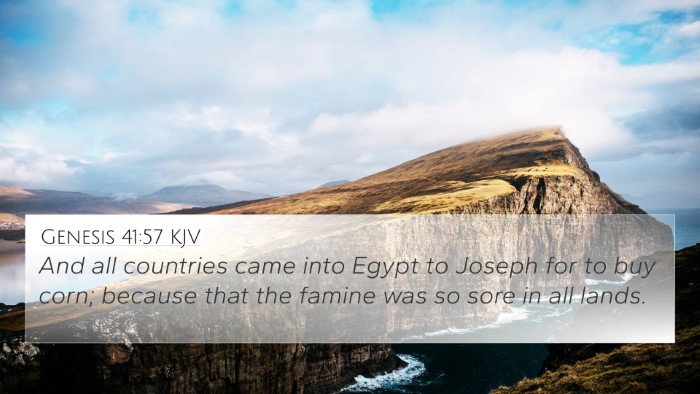
Genesis 41:57 (KJV) »
And all countries came into Egypt to Joseph for to buy corn; because that the famine was so sore in all lands.
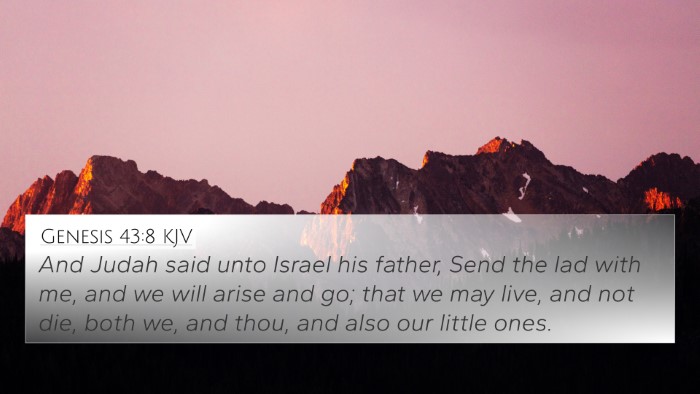
Genesis 43:8 (KJV) »
And Judah said unto Israel his father, Send the lad with me, and we will arise and go; that we may live, and not die, both we, and thou, and also our little ones.
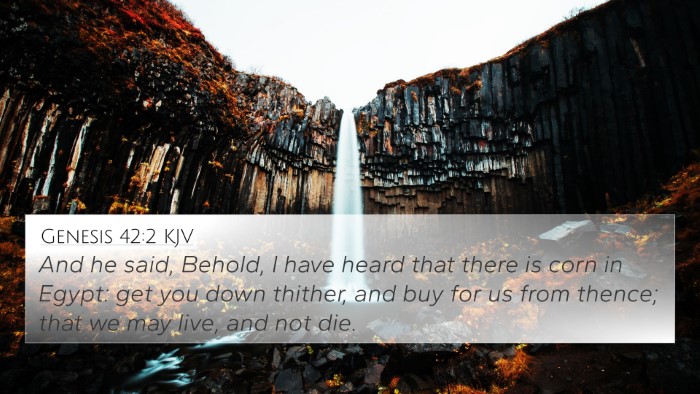
Genesis 42:2 (KJV) »
And he said, Behold, I have heard that there is corn in Egypt: get you down thither, and buy for us from thence; that we may live, and not die.
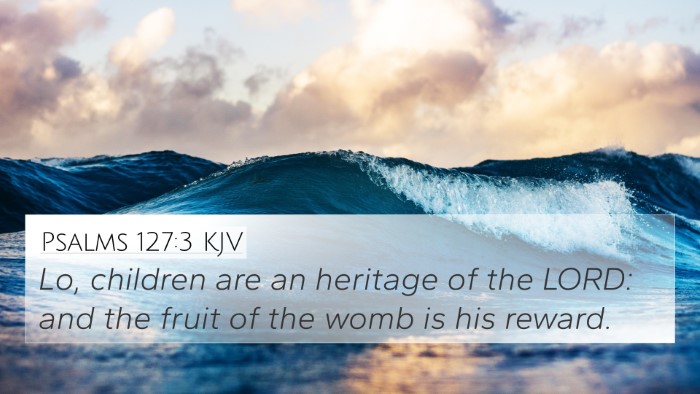
Psalms 127:3 (KJV) »
Lo, children are an heritage of the LORD: and the fruit of the womb is his reward.
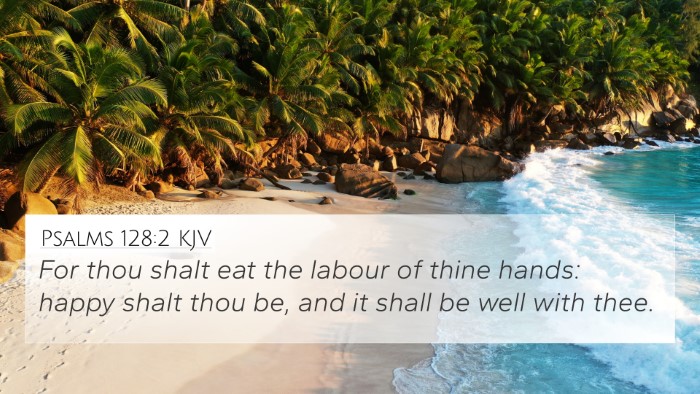
Psalms 128:2 (KJV) »
For thou shalt eat the labour of thine hands: happy shalt thou be, and it shall be well with thee.
Nehemiah 5:2 Verse Analysis and Similar Verses
Nehemiah 5:2 reads, "For there were that said, We, our sons, and our daughters, are many: therefore we take up corn for them, that we may eat, and live.” This verse brings into focus the dire economic conditions faced by the people during Nehemiah’s time and serves as a reflection of broader themes of hardship, community, and justice in the Scriptures.
The commentary on this verse delves into the plight of the Jewish community who, upon their return from Babylonian exile, struggled not only for survival but also with the burdens imposed by the wealthier classes. Here are key insights drawn from public domain commentaries:
- Matthew Henry's Concise Commentary: Henry emphasizes the collective struggle of families and the desperate measures they resorted to for sustenance. The verse reflects both physical needs and social injustices, which Nehemiah seeks to address.
- Albert Barnes' Notes: Barnes notes the implications of the term "we take up corn," showcasing the severity of their condition. Families were compelled to gather provisions, highlighting the threat of famine and the overwhelming sense of despair that loomed over the community.
- Adam Clarke's Commentary: Clarke provides insight into the communal nature of their predicament. He points out that the reference to their many sons and daughters illustrates the growth of the family context amid suffering, thereby reinforcing the urgency of the social crisis Nehemiah confronted.
Cross-Referenced Themes
This verse not only stands alone but also connects with various other Scriptures that highlight similar themes of social justice, community welfare, and God’s provision.
- Exodus 22:25: "If you lend money to any of my people, you shall not be like a moneylender to him, and you shall not exact interest from him." This verse underscores the importance of fair treatment among fellow Israelites.
- Leviticus 25:35: "If your brother becomes poor and cannot maintain himself with you, you shall support him as though he were a stranger and a sojourner, and he shall live with you." This speaks to the duty of community support during times of need.
- Psalms 37:25: "I have been young, and now am old, yet I have not seen the righteous forsaken or his children begging for bread." A promise of God’s provision, reassuring that righteous individuals will be cared for.
- Isaiah 58:7: "Is it not to share your bread with the hungry and bring the homeless poor into your house?" This reflects God’s call for His people to assist those in need, resonating with Nehemiah's context.
- Luke 3:11: "And he answered them, 'Whoever has two tunics is to share with him who has none, and whoever has food is to do likewise.'" A New Testament reiteration of the call to communal living and generosity.
- Acts 4:32: "Now the full number of those who believed were of one heart and soul, and no one said that any of the things that belonged to him was his own, but they had everything in common." This illustrates the early church's commitment to community welfare.
- James 2:15-16: "If a brother or sister is poorly clothed and lacking in daily food, and one of you says to them, 'Go in peace, be warmed and filled,' without giving them the things needed for the body, what good is that?" This challenges the faithful to act on their faith with tangible support for those in need.
Understanding the Context
The verse must be viewed within the larger narrative of Nehemiah, who emerges as a leader advocating for social justice. The complaints about hunger and inequity echo throughout Scripture and come to a head in this essential moment in Judah’s history. Nehemiah's empathetic response illustrates effective leadership amid adversity, aiming to unify the people against both external opposition and internal injustices.
Furthermore, understanding Nehemiah 5:2 calls for using Bible cross-referencing tools. These connections allow deeper study into how various biblical themes resonate across the texts:
- Tools for Bible cross-referencing: Resources such as concordances and bible study guides help in locating similar themes.
- How to find cross-references in the Bible: Explore indices and thematic studies to uncover links between passages.
- Identifying connections between Old and New Testament: Studying how themes develop and re-emerge across the biblical canon.
Thematic Analysis
The relationship between Nehemiah 5:2 and its cross-references creates an inter-Biblical dialogue that deepens our understanding of divine justice. As believers study these connections, they can uncover the layers of meaning that these scriptures communicate collectively about charity, community, and God’s provision.
In summary, Nehemiah 5:2 serves as a poignant reminder of our collective responsibility towards one another, emphasizing the need for compassion and active support in times of distress. The connections made through cross-referencing help illuminate the continued relevance of these themes in contemporary contexts, advocating for a faith that is not only articulated in words but is also reflected in compassionate actions.
